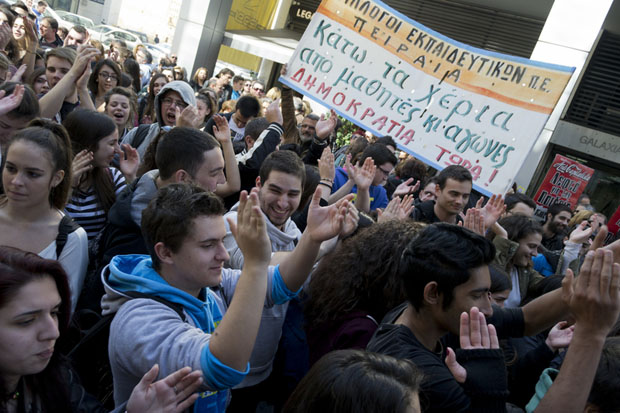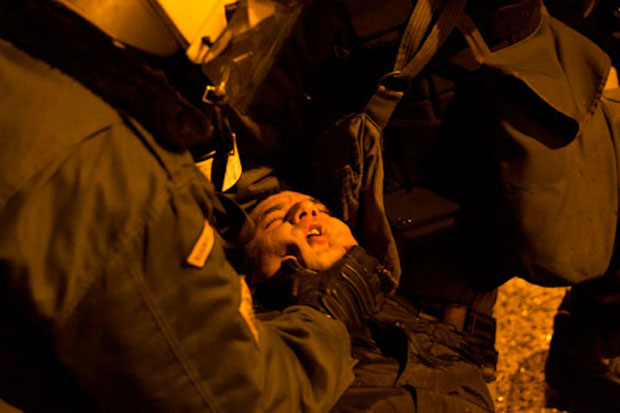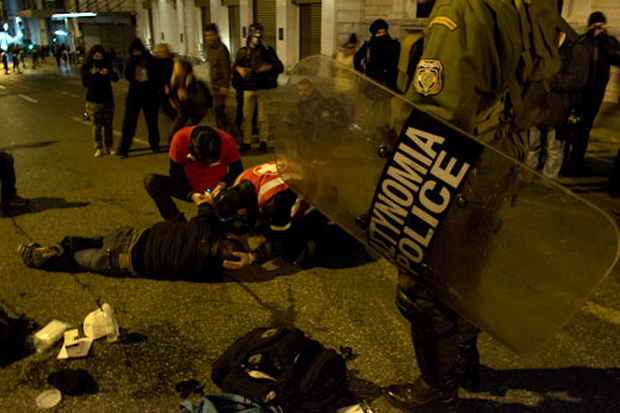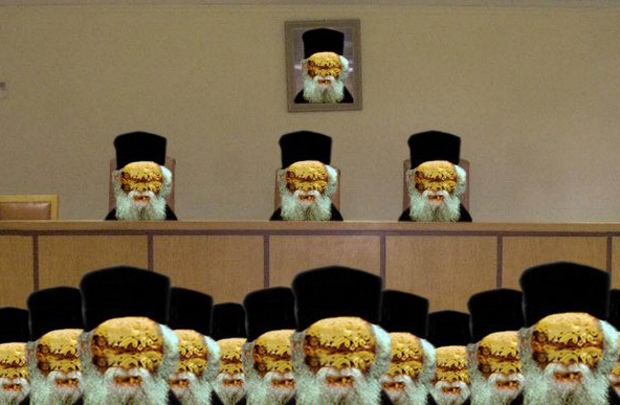Index relies entirely on the support of donors and readers to do its work.
Help us keep amplifying censored voices today.
There is a “dictatorship of the gay minority” and gay people should be “treated” by members of Golden Dawn. These are only excerpts of a 15-minute homophobic rant by journalist Dimos Verikios during a recent episode of his daily show on Alpha radio station. The outburst was met with a number of complaints and social media outrage, and has been condemned by the Journalists’ Union of Athens Daily Newspapers.
Verikios was targeting gay writer Auguste Corteau, who revealed his sexuality by publicly stating that he won’t be joining new political party The River, preferring to stay loyal to his husband and his books. In response to this, the radio host among other things said: “That’s why society goes to hell. Being gay today and crying it out loud is considered a cunning behaviour and not a problem.”
Verykios’ outburst seems to be only the tip of the iceberg. Homophobic stereotypes and discrimination based on sexual orientation is widespread in Greece, both on state level and in wider society. The 2013 annual report by the European arm of the international gay right organisation ILGA, reports a wave of violence directed at the LGBTI community by extremists, ranking Greece 25th out of 49 European countries for gay rights. In 2012, European Commission against Racism and Intolerance urged Greek authorities to raise awareness “on the implementation of the principle of equal treatment regardless of racial or ethnic origin, religious or other beliefs, disability, age or sexual orientation”.
The extension of legislation (institution of civil partnership) to same sex couples has “frozen” because of continuing pressures from the Greek Orthodox Church, while at the same time the country has been found violating the European Convention of Human Rights. Index has previously reported on homophobic behaviour and attacks by Golden Dawn and its supporters. Firstly, regarding the persecution of people involved in the play “Corpus Christi” and secondly, regarding the mockery of journalist Tasos Theodoropoulos by the far-right publication called “Stohos”, and the subsequent attack on him.
Electra Leda Koutra is the president of the NGO Hellenic Action for Human Rights and lawyer for the Greek Transgender Support Association. She was harassed by policemen and illegally detained for a short while last June for trying to communicate with her transgender client. “Many cases do not reach the courts because of the ‘outing’ that the victims would have to unwillingly go through during the legal procedure,” she explains to Index, adding that many of these cases often go unresolved.
Verykios outburst was answered by a collective complaint from the LGBTQI community — nearly 20 organisations and collectivities took part — to the National Council for Radio and Television (ESR). The president of ESR, Ioannis Laskaridis, said told media that the volume of complaints filed was “unusual”.
Corteau is suing Verykios over the statements, posting on his Facebook page that: “I have decided that I have a duty to stand up for and protect the people I love and then any person that could find themselves in my position, a target of the poisonous language represented by Mr Verikios.” Corteau’s lawyer Christos Gramatidis explained the nature of the legal action to Index: “It is the first lawsuit of its kind (compensation for moral damages, eponymous opposing parties) based on the basis of attacking personality and consisting of libel and insult of gender identity. As a country we haven’t incorporated yet the European legal framework of combating intolerance”.
Gramatidis added: “There are so many people from the LGBTI community who accept bullying in schools and elsewhere in society but they do not have the ability to go into court.”
This article was published on 7 April 2014 at indexoncensorship.org

Students protesting outside the offices of Piraeus Public Prosecutor (Image: Nikolas Georgiou/Demotix)
Between 200 – 250 students last week staged a demonstration outside the offices of the Piraeus’ Public Prosecutor against police interference in school protests, following high school students being taken in for police questioning.
Joined by the Secondary Teacher Union of Piraeus and the Parent Association of Keratsini the students shouted slogans like “we won’t be terrorised” and “money for education”. The protest came after students were interrogated by police over an occupation of Keratsini’s 2nd High School in October, in protest at the murder of rapper Pavlos Fyssas by a member of the far right Golden Dawn.
Students were asked about their own and their teachers’ political preferences, especially those who had been striking against public job cuts and forced transfers. There were also media reports that students were questioned about their parents’ voting preferences. A high school student who participated in the protest said they were asked “to give as many names as possible”, adding that they were threatened with having a criminal record if they refused.
Greek police has said it was obliged to conduct an investigation into the matter. It did so on the basis of a legislative act from 2000 punishing by imprisonment attempted occupations or disruption of the “smooth functioning” of a school. The act remained inactive until 2011 when school protests against government plans on privatisation of education, prompted a Supreme Court order for investigations in schools.
Maria Delli, board member of the Parent Federation in Attica District told Index on Censorship: “It is not an unprecedented incident, we have been experiencing police interference and student profiling in recent years. The government is trying to criminalise the common struggles of students and teachers for education. Students complain about the obvious: Not having teachers, not having heating infrastructures and having to pay for their books during the economic crisis.” She added that there was no damage to the school.
Nikos Peritoyannis, president of Parent Association of Keratsini commented to Index on Censorship: “It is a positive outcome. It can be definitely seen as a result of the pressure from the protest actions undertaken by students, teachers and other social groups. However, it does not mean that similar cases will cease to exist. As the struggle against the privatization of education goes on, the government will have to intensify monitoring and suppressing policies.”
On Monday 20 February, Piraeus’ Public Prosecutor finally decided to temporarily withdraw the case as there was no criminal offence for which to prosecute the students. Apart from the incident in Keratsini, Athens’ Attica General Police Directorate (GADA) has also issued a document informing police stations to conduct meetings with school directors in order to disclose “any immediate problems schools are facing”. On 13 February, a similar document reached the director of a kindergarden in New Psychiko, Athens. There was public outcry from teachers’ associations in the media.
This article was posted on 24 February 2014 at indexoncensorship.org

Unconscious protester dragged by police during an anti-fascist demonstration (Image: Nikolas Georgiou)
Following the reappearance of Golden Dawn’s “battalion squads” last week in Keratsini, where hip hop artist Pavlos Fyssas was murdered, antifascist rallies and demos are increasingly met with state repression and police violence.
On 25 January, a group of 80-100 neo-fascists took down a banner in Fyssas’ honour and attacked a self-managed hangout called “Resalto”. As documented on social media, the riot police merely looked on during the attack.
On Saturday 1 February, two protests, one from anti-fascists and anarchists, and one from Golden Dawn, were planned at different locations in the centre of Athens.
Anti-fascists were calling for a rally in protest at Golden Dawn’s disrespect to Pavlos Fyssas, as well as the refugee tragedy at Farmakonisi, an alleged pushback operation which had already prompted an investigation and led to condemnation from international human rights organisations.
Golden Dawn had called for its annual march at the Imia memorial. Members and supporters of the party gathered to commemorate the Imia crisis in 1996, a conflict between Greece and Turkey over two small rocky islands during which three Greek navy officers died.
Even though the police had banned all marches — though not rallies — “for reasons of public safety”, Golden Dawn defied the ban and marched through central Athens. There was no intervention from the police.
Elsewhere in the capital, at Syntagma Square, clashes broke out between protesters and the police when two men with Greek flags on their jacket were spotted and chased down. One of them managed to escape through the riot police and the other one was attacked and injured slightly. Despite anti-fascist efforts to safeguard the rally, riot police dispersed the protesters using stun grenades and tear gas. Some protesters were arrested.
Nikolas Georgiou, an independent photojournalist, witnessed an unconscious man being dragged by police.
“They had him in handcuffs and he had already passed out when they started dragging him. It was only when a colleague of mine told them that he was not breathing, that they seemed to worry,” Georgiou told Index on Censorship.

Police clashed with anti-fascist protesters in Athens. (Photo: Nikolas Georgiou)
When a member of parliament asked riot police to explain the incident, the answer given was that the protester had “slipped and he fell”.
The man, a Turkish refugee named Saltchuk Gungor, was transferred to the Georgios Genimatas Hospital under close supervision of riot police squads.
People expressing solidarity with Gungor complained about the police presence, while Syriza’s MP Afroditi Stampouli denounced the incident as “unacceptable for democracy”.
Gungor is being charged with the felony of assaulting police officers while having his face covered. He, however, denies the charges: “I didn’t do anything. I was attacked without a reason. They hit me and they dragged me down,” he stated on the website left.gr. Photos taken by witnesses show that Gungor did not have his face covered.
The clashes did not stop at Syntagma Square. Police squads chased anti-fascists at the Monastiraki subway station. They used tear gas amid commuters and chased people through the subway rails.
Golden Dawn also announced its “plan B” at Saturday’s rally — the founding of a party called “National Dawn”. If the government decides to continue the ban of Golden Dawn, the new party will serve as an alternative.
Half of Golden Dawn MP’s are being prosecuted with charges of being part of “a criminal organization”, and one third are now in jail.
This article was posted on 3 February 2014 at indexoncensorship.org

On 16 January, Greek blogger Filippos Loizos, responsible for the satirical Facebook page of Elder Pastitsios, was convicted for “malicious blasphemy and religious insult” and sentenced to 10 months in prison, suspended for three years.
Loizos has set up the page mocking a well-known deceased Greek Orthodox monk — Elder Paisios — by intentionally combining his name with a popular Greek food called “pastitsio”, a pasta based dish with béchamel sauce.
His arrest in late September 2012, came after Christos Pappas, an MP from the now-banned neo-fascist party Golden Dawn, posed a parliamentary question calling for the blogger’s arrest on the basis of the country’s anti-blasphemy laws.
Pappas is now facing charges of being involved in a criminal organization.
“My prosecution was somehow expected. At the time I drew a lot of attention on social media. The neonazi party saw ‘a chance’ in accusing me as a blasphemer, satisfying a very conservative society and inspiring strong national sentiments,” Loizos told Index on Censorship.
Loizos explained that the court did not understand his intentions — delivering a stinging rebuke for what he perceived as the monk’s dangerous nationalism and intolerance.
“The judges were very aggressive and did not want to understand my argument. They insisted on saying my intention was to insult because I hadn’t censored any posts of visitors which were considered blasphemous or vulgar. I would never do that. In a democracy we are all ‘condemned’ to disagree,” says Loizos.
Reactions in the press and on the internet after the blogger’s conviction were immediate and vociferous. Far-right publishing and Orthodox websites were gloating, while Loizos’ sympathisers and free speech advocates argued it was “a blow to freedom of expression”.
On 20 January 2014, Amnesty International expressed serious concerns over the case, while calling on Greek authorities to “repeal the anachronistic anti-blasphemy legislation”.
The Hellenic League for Human Rights (HLHR), the oldest human rights organisation in Greece, had earlier issued a press release, stating its “unfortunate certainty of an institutional and ideological setback that does not seem to end”.
“Today’s decision shows that freedom of speech, a fundamental pillar of social consistency in a state with ‘rule of law’, is being challenged not only by the enemies of democracy but by the judicial institutions,” according to the release.
Dimitris Christopoulos, an assistant professor of state and legal theory at the Department of Political Science and History at Panteion University in Athens, and vice president of the International Federation for Human Rights, told Index that “this decision is a message on how justice perceives political coexistence in society. It’s like saying ‘when you talk about God in a way we do not like, you will be punished’. In other words, people can joke about everything they want, except religion”.
Contrary to some allegations that the judges suffered social media illiteracy because of their age, Christopoulos told Index on Censorship that they were young and seemed to “fully understand the role of social media”.
In late September 2012, when Loizos was arrested, Vassilis Sotiropoulos, a lawyer and blogger specialising in internet legislation, told Index: “The legislature refuses to address the issue of internet censorship, thereby allowing law enforcers — prosecutors, police officers, judges and lawyers — to freely interpret and utilise the existing legal tools (…) the case of Elder Pastitsios provided perhaps the first example in Greece of an internet company disclosing information to the government in order to identify an individual accused of ‘alleged offences relating to religious satire’.”
However, it is not the first time cases regarding religious blasphemy have reached the courts. In 2012, controversial theatrical play “Corpus Christi” resulted in the legal prosecution and public harassment of the play’s director and actors by Golden Dawn members and Orthodox religious groups.
Legal experts told Index that there are several ongoing cases involving blasphemy in Greece and that the country should follow the Council of Europe’s recommendations and reports on abolishing “the offence of blasphemy”. According to these recommendations, freedom of thought and freedom of expression are being limited by blasphemy laws.
Loizos said he is going to appeal the verdict “for reasons of dignity”.
“We should abolish this blasphemy law in order to protect free expression,” he said.
This article was published on 23 January 2014 at indexoncensorship.org